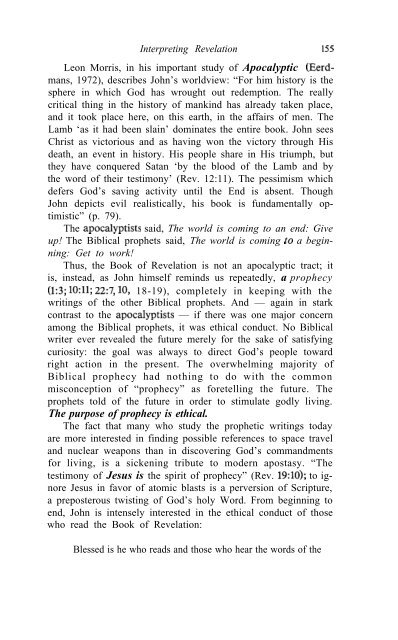- Page 2 and 3:
PARADISE RESTORED
- Page 4 and 5:
Copyright @Dominion Press Fkst Prin
- Page 6 and 7:
. . . Vlll Paradise Restored Part F
- Page 8 and 9:
x Paradise Restored Rev. Lewis Bulk
- Page 10 and 11:
When the sun has come, darkness pre
- Page 12 and 13:
4 Paradise Restored The “spiritua
- Page 14 and 15:
6 Paradise Restored You must not su
- Page 16 and 17:
8 Paradise Restored now reigning fr
- Page 18 and 19:
10 Paradise Restored The nomads of
- Page 20 and 21:
12 Paradise Restored God,” stop e
- Page 22 and 23:
You know how it is when some great
- Page 24 and 25:
16 Paradhe Restored of Revelation y
- Page 26 and 27:
18 Paradise Restored hard work, nec
- Page 28 and 29:
20 Paradise Restored 10. The crossi
- Page 30 and 31:
We will begin, then, with the creat
- Page 32 and 33:
24 Paradise Restored inal covering
- Page 34 and 35:
26 Paradise Restored Thus says the
- Page 36 and 37:
4 THE HOLY MOUNTAIN The Location of
- Page 38 and 39:
The Holy Mountain 31 mountaintop).
- Page 40 and 41:
The Holy Mountain 33 You were in Ed
- Page 42 and 43:
The Holy Mountain 35 To the honor o
- Page 44 and 45:
What - or rather Who was it that wa
- Page 46 and 47:
40 Paradise Restored The wolf will
- Page 48 and 49:
42 Paradise Restored Testament, whi
- Page 50 and 51:
44 Paradise Restored godly man is
- Page 52 and 53:
46 Paradise Restored portray this s
- Page 54 and 55:
What, then, was God to do? What els
- Page 56 and 57:
50 Paradise Restored is impossible
- Page 58 and 59:
52 Paradise Restored apostatizes, n
- Page 60 and 61:
54 Paradise Restored Indeed, a very
- Page 62 and 63:
He it is Who won victory from His d
- Page 64 and 65:
58 Paradise Restored The Voice of t
- Page 66 and 67:
60 Paradise Restored canopy was als
- Page 68 and 69:
62 Paradise Restored ises of the Ne
- Page 70 and 71:
PART 111 THE GOSPEL OF THE KINGDOM
- Page 72 and 73:
8 THE COMING OF THE KINGDOM Adam wa
- Page 74 and 75:
The Coming of the Kingdom 69 the Mi
- Page 76 and 77:
The Coming of the Kingdom -71 The A
- Page 78 and 79:
The Coming of the Kingdom 73 him, o
- Page 80 and 81:
The Coming of the Kingdom 75 toriou
- Page 82 and 83:
9 THE REJECTION OF ISRAEL Reading t
- Page 84 and 85:
The Rejection of Israel 79 definiti
- Page 86 and 87:
The Rejection of Israel 81 wrote th
- Page 88 and 89:
And when He Who spake unto Moses, t
- Page 90 and 91:
86 Paradise Restored so to teach th
- Page 92 and 93:
88 Paradise Restored And as He was
- Page 94 and 95:
90 Paradise Restored pangs” (Matt
- Page 96 and 97:
92 Paradise Restored reference in L
- Page 98 and 99:
94 Paradise Restored the sun, rotti
- Page 100 and 101:
COMING ON THE CLOUDS We have seen t
- Page 102 and 103:
Coming on the C[ouds 99 Behold, the
- Page 104 and 105:
Coming on the Clouds 101 And your s
- Page 106 and 107: Corning on the Clouds 103 I kept lo
- Page 108 and 109: Coming on the Clouds 105 New Covena
- Page 110 and 111: 12 THE RISE OF ANTICHRIST According
- Page 112 and 113: The Rise of Antichrist 109 first pl
- Page 114 and 115: The Rise of Antichrist 111 Fifth, t
- Page 116 and 117: The Rise of Antichrist 113 ing that
- Page 118 and 119: 13 THE LAST DAYS As we began to see
- Page 120 and 121: The Last Days 117 From Pentecost to
- Page 122 and 123: The Last Days 119 The early Church
- Page 124 and 125: The Last Days 121 on earth, when th
- Page 126 and 127: The objects of worship formerly wer
- Page 128 and 129: 126 Paradise Restored they should n
- Page 130 and 131: 128 Paradise Restored mystery, lest
- Page 132 and 133: 130 Paradise Restored imputation to
- Page 134 and 135: Who, then, is this Christ and how g
- Page 136 and 137: 134 Paradise Restored “the Day of
- Page 138 and 139: 136 Paradise Restored this view of
- Page 140 and 141: 138 Paradike Restored righteous, in
- Page 142 and 143: 140 Paradise Restored be raised:
- Page 144 and 145: 16 THE CONSUMMATION OF THE KINGDOM
- Page 146 and 147: The Consummation of the Kingdom 145
- Page 148 and 149: The Consummation of the Kingdom 147
- Page 150 and 151: PART IV STUDIES IN THE BOOK OF REVE
- Page 152 and 153: 17 INTERPRETING REVELATION From the
- Page 154 and 155: Interpreting Revelation 153 in Reve
- Page 158 and 159: When did prophet and vision cease f
- Page 160 and 161: 160 Paradise Restored end of the Ol
- Page 162 and 163: 162 Paradise Restored the citizens
- Page 164 and 165: 164 Paradise Restored by persecutin
- Page 166 and 167: 166 Paradise Restored in order to c
- Page 168 and 169: For the Lord touched all parts of c
- Page 170 and 171: 170 Paradise Restored The following
- Page 172 and 173: 172 Paradise Restored ding feast of
- Page 174 and 175: 20 THE BEAST AND THE FALSE PROPHET
- Page 176 and 177: The Beast and the False Prophet 177
- Page 178 and 179: The Beast and the False Prophet 179
- Page 180 and 181: The Beast and the False Prophet 181
- Page 182 and 183: The Beast and the False Prophet 183
- Page 184 and 185: A king who has founded a city, so f
- Page 186 and 187: 188 Paradise Restored imony of the
- Page 188 and 189: 190 Paradise Restored this kind of
- Page 190 and 191: 192 Paradise Restored tions with th
- Page 192 and 193: Who, then, is He Who has done these
- Page 194 and 195: 196 Paradise Restored image, and ha
- Page 196 and 197: 198 Paradise Re ored the nations an
- Page 198 and 199: 200 Paradise Restored two go togeth
- Page 200 and 201: The Saviour works mightily every da
- Page 202 and 203: 204 Paradise Restored And the forme
- Page 204 and 205: 206 Paradise Restored wiped away ou
- Page 206 and 207:
208 Paradise Restored You will be f
- Page 208 and 209:
PART V TO THE ENDS OF THE EARTH Hen
- Page 210 and 211:
24 FULFILLING THE GREAT COMMISSION
- Page 212 and 213:
Fulfilling the Great Commission 215
- Page 214 and 215:
Fulfilling the Great Commission 217
- Page 216 and 217:
Fulfilling the Great Commission 219
- Page 218 and 219:
Fulfilling the Great Commission 221
- Page 220 and 221:
APPENDIX A THE ESCHATOLOGY OF DOMIN
- Page 222 and 223:
The Eschatology of Dominion: A Summ
- Page 224 and 225:
The Eschatology of Dominion: A Summ
- Page 226 and 227:
The Eschatology of Dominion: A Summ
- Page 228 and 229:
The Eschatology of Dominion: A Summ
- Page 230 and 231:
The Eschatology of Dominion: A Summ
- Page 232 and 233:
The Eschatology of Dominion: A Summ
- Page 234 and 235:
238 Paradise Restored Eleazar the a
- Page 236 and 237:
240 Paradise Restored the high-prie
- Page 238 and 239:
242 Paradise Restored Scythopolis,
- Page 240 and 241:
244 Paradise Restored been preserve
- Page 242 and 243:
246 Paradise Restored against anoth
- Page 244 and 245:
248 Paradise Restored forced to get
- Page 246 and 247:
250 Paradise Restored war would fol
- Page 248 and 249:
252 Paradise Restored swords, by wa
- Page 250 and 251:
254 Paradise Restored store him his
- Page 252 and 253:
256 Paradise Restored that Eleazar
- Page 254 and 255:
258 Paradtie Restored still alive,
- Page 256 and 257:
260 Paradise Restored Dagon, and as
- Page 258 and 259:
262 Paradise Restored one night? An
- Page 260 and 261:
264 Paradise Restored and took piec
- Page 262 and 263:
266 Paradise Restored its progress,
- Page 264 and 265:
268 Paradise Restored should either
- Page 266 and 267:
270 Paradise Restored I suppose, th
- Page 268 and 269:
272 Paradise Restored pent, and ame
- Page 270 and 271:
274 Paradise Restored famine, and t
- Page 272 and 273:
276 Paradise Restored slain above [
- Page 274 and 275:
278 Paradise Restored outer [court
- Page 276 and 277:
280 Paradise Restored the most lame
- Page 278 and 279:
282 Paradise Restored accord, fall
- Page 280 and 281:
284 Paradise Restored slew those wh
- Page 282 and 283:
286 Paradise Restored of the punish
- Page 284 and 285:
288 Paradise Restored 7. In the spr
- Page 286 and 287:
290 Paradise Restored each other, h
- Page 288 and 289:
292 Paradise Restored Chilton, Davi
- Page 290 and 291:
294 Paradise Restored The Original
- Page 292 and 293:
296 Paradise Restored Terry, Milton
- Page 294 and 295:
Paradise Restored Genesis 25:30 26
- Page 296 and 297:
300 1 Chronicles 28:2 135 2 Chronic
- Page 298 and 299:
302 Jeremiah 4:1 4:11-13 4:30-31 7:
- Page 300 and 301:
304 Matthew 7:22-23 10:23 11:10 11:
- Page 302 and 303:
306 Paradise Restored Acts 2:40 3:2
- Page 304 and 305:
308 Eptiesians 4:24 24, 25 5:14 134
- Page 306 and 307:
310 Paradise Restored 108 192 108 1
- Page 308 and 309:
Abomination of Desolation, 84, 91-9
- Page 310 and 311:
Generation, terminal, 80, 86-89, 91
- Page 312 and 313:
Resurrection, general, 139, 143-48,
- Page 314 and 315:
y Gary North You have in your hand
- Page 316 and 317:
Publisher’s Epilogue 321 Swaggart
- Page 318 and 319:
Publisher’s Epilogue 323 Dominion
- Page 320 and 321:
Publisher’s Epilogue 325 Salvatio
- Page 322 and 323:
Publisher’s Epilogue 327 eschatol
- Page 324 and 325:
Publishers Epilogue 329 The Five Po
- Page 326 and 327:
1. 2. 3. 4. 5. Pub[isher_3Epilogue
- Page 328 and 329:
Publisherh Epilogue 333 munists hav
- Page 330 and 331:
WHAT IS THE ICE? by Gary North, Pre
- Page 332 and 333:
What IS the ICE? 33-7 Protestant) a
- Page 334 and 335:
What Is the ICE? 339 reconstruction
- Page 336:
What Is the ICE? 341 politicians an


















